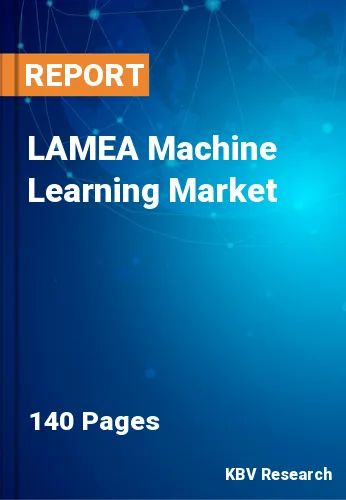
The Latin America, Middle East and Africa Machine Learning Market would witness market growth of 40.1% CAGR during the forecast period (2023-2030).
One of the beneficial uses of machine learning is forecasting renewable energy sources and projections of electricity production. Since the primary renewable energy sources, namely wind, and solar, are changeable in nature and are reliant on outside influences, forecasting has become essential in the energy and utilities sector. The model for promoting the use of renewable energy is Germany. Wind speed and solar radiation intensity, however, are consistently inconsistent. In order to preserve the balance between energy supply and demand, machine learning businesses offer their software and services to energy and utility firms.
Retailers are using machine learning (ML) models to comprehend and analyze consumer behavior data gathered from various trends, demographics, and preferences more effectively. In the retail sector, personalized experiences are gaining importance. Using historical data, ML models can predict which products should be recommended to clients. The eCommerce industry's explosive growth is a significant force behind the rise of the market. Retailers may study customers' digital activity patterns to enhance the buying process.
Companies in the IT & telecom industry are paying attention to real-time insights enabled by ML and AI. The market is also expanding because of IoT (Internet of Things) and 5G technology. Telecom businesses use ML algorithms to monitor data pouring from various network interfaces.
By leveraging artificial intelligence and machine learning, the oil-rich Gulf States actively strive to diversify their economies throughout the Middle East and Africa. Most Gulf countries recognize the value of contemporary technology and are always working to create new technologies. Regarding technological advancement and acceptability, the United Arab Emirates is at the top of the Arab world. Smart cities and autonomous transportation projects also drive the need for AI and ML skills in the area. In order to encourage the use of advanced technology in the area, Brazil and Uruguay are two Latin American countries that are putting new policies into place. The area is thus predicted to provide novel, alluring development potential.
The Brazil market dominated the LAMEA Machine Learning Market by Country in 2022, and would continue to be a dominant market till 2030; thereby, achieving a market value of $7,809.2 million by 2030. The Argentina market is estimated to witness a CAGR of 40.9% during (2023 - 2030). Additionally, The UAE market would exhibit a CAGR of 39.8% during (2023 - 2030).
Based on Enterprise Size, the market is segmented into Large Enterprises, and SMEs. Based on Component, the market is segmented into Services, Software, and Hardware. Based on End-use, the market is segmented into Advertising & Media, BFSI, Automotive & Transportation, Manufacturing, Agriculture, Retail, Healthcare, and Others. Based on countries, the market is segmented into Brazil, Argentina, UAE, Saudi Arabia, South Africa, Nigeria, and Rest of LAMEA.
Free Valuable Insights: The Worldwide Machine Learning Market is Projected to reach USD 408.4 Billion by 2030, at a CAGR of 36.7%
The market research report covers the analysis of key stake holders of the market. Key companies profiled in the report include Amazon Web Services, Inc. (Amazon.com, Inc.), Baidu, Inc., Google LLC (Alphabet Inc.), H2O.ai, Inc., Hewlett-Packard enterprise Company (HP Development Company L.P.), Intel Corporation, IBM Corporation, Microsoft Corporation, SAS Institute, Inc., SAP SE
By Enterprise Size
By Component
By End-use
By Country
Our team of dedicated experts can provide you with attractive expansion opportunities for your business.
